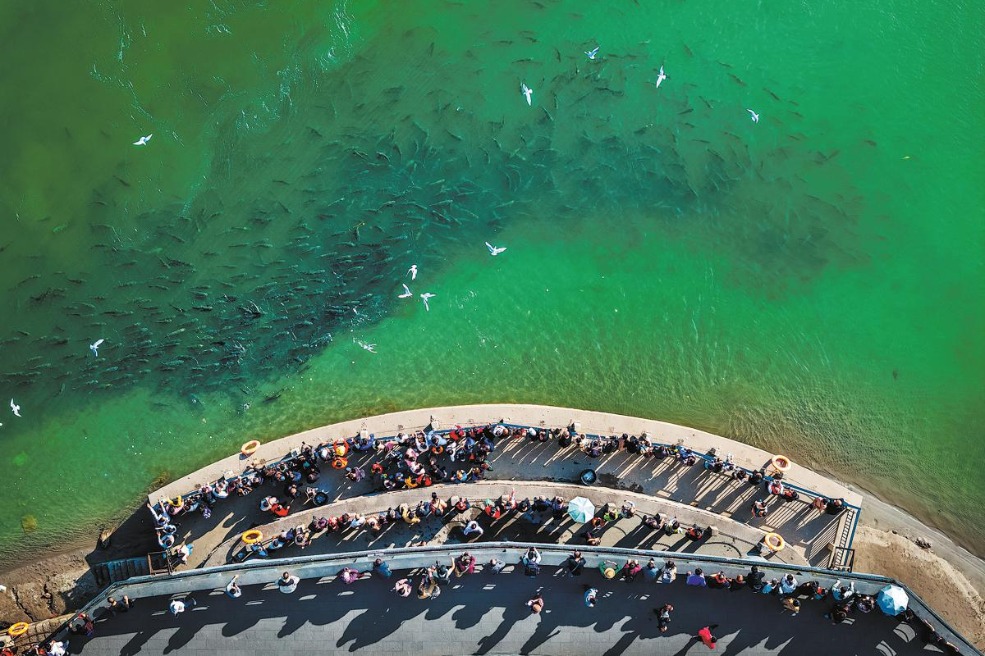Pacific Ocean should not be turned into a sea of zero-sum disturbances: China Daily editorial


When asked how he proposed to balance his country's ties between the United States and China when facing the media in his meeting with the US president at the White House on Tuesday last week, Philippine President Ferdinand Marcos Jr apparently intended to take advantage of his reply to curry favor with his US host.
But before Marcos finished his I-am-always-on-your-side ingratiation, his US counterpart's abrupt interjection obviously caught the Philippine president off guard.
That was because he had been told at the Pentagon one day earlier that the Philippines should continue to do the dirty work it has been doing in the South China Sea as a provoker of China.
But as predicted by many observers, Marcos' bewilderment proved to be short-lived, as just one week after his trip to the White House, his government made a bid to purchase US arms, pretending it has no choice but to do so for its own security.
Philippine Defense Secretary Gilberto Teodoro Jr on Wednesday urged the country's Congress to amend the military's modernization program. "The challenge isn't just traditional threats anymore," he said in a panel discussion. "We now face asymmetric and hybrid threats, like cyberattacks and others."
The Philippines has launched a sweeping $35-billion military modernization program aimed at bolstering its defense capabilities over the next decade, including the acquisition of advanced naval vessels, planes and missile systems, in a move to push back against what it claims is China's "threat".
Meanwhile, Armed Forces of the Philippines Chief-of-Staff General Romeo Brawner Jr said in the same panel discussion that the military is enhancing its cyberwarfare capabilities, as he described cyberspace as a new frontier for conflict, adding "We will harness this not only to defend our country, but, if necessary, to be on the offense".
The Marcos government's to-do list is therefore no longer restricted to staging its look-at-the-bully farces in the South China Sea, and it is also acting as a US agent in the new frontier of cyberspace, laying bare the hypocrisy of its "China threat" theory.
In stark contrast with the long-term strategic restraint China has been practicing in handling the maritime disputes with the Philippines, Manila's moves only serve to expose to the world that it is a US puppet in the South China Sea.
The Marcos government's increased spending on military in the costly new frontier warfare will directly benefit the US military-industrial complex. That this happens when the Philippines faces no actual security threat in either conventional or the new cyber frontier only proves the Pentagon's success with its other AI tactic — "artificial intimidation".
The US applies similar tactics to its other regional allies and partners as well by hyping up a "China threat". Both Australia and Japan are being pressed to increase their purchases of US weapons.
In a move that experts said is undoubtedly "directed at China", the US Air Force's Resolute Force Pacific exercise from July 10 to Aug 8 has seen more than 400 aircraft and 12,000 personnel from the US and allies such as Australia and Japan converge on Guam.
The exercises in the Pacific come on the back of US Defense Under Secretary Elbridge Colby's recent comments, calling on allies, such as Australia and Japan, to make clear if they would commit troops to a conflict with the Chinese mainland over the Taiwan question.
Meanwhile, the US and Japan have been discussing a scenario, in which the US military would use nuclear weapons in the event of a contingency, during talks on so-called extended deterrence. It is the first time the two countries have delved into the issue, in a sign that they are seeking to strengthen the US nuclear umbrella amid what they allege is intensifying military activity by "hostile countries".
These are all desperate moves by the US to try and create a confrontational atmosphere reflecting the unwavering focus of its strategic emphasis on the Asia-Pacific. Moves that are detrimental to regional peace and stability.
The Pacific Ocean is a place of peace and should not be turned into a sea of artificial disturbances, as Chinese National Defense Ministry spokesperson Zhang Xiaogang said on Wednesday while taking questions on the US moves.
The US allies and partners in the Asia-Pacific should realize that threatening and undermining the security of other countries will not bring about their own security. Only by fostering a comprehensive, cooperative and lasting security perspective and embarking on a new security path based on dialogue rather than confrontation, partnership rather than alliance, and win-win rather than zero-sum strategies can the region truly ensure security.


































